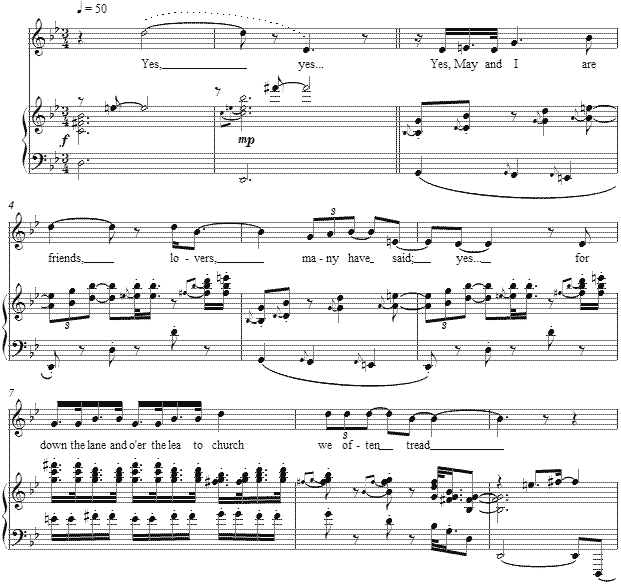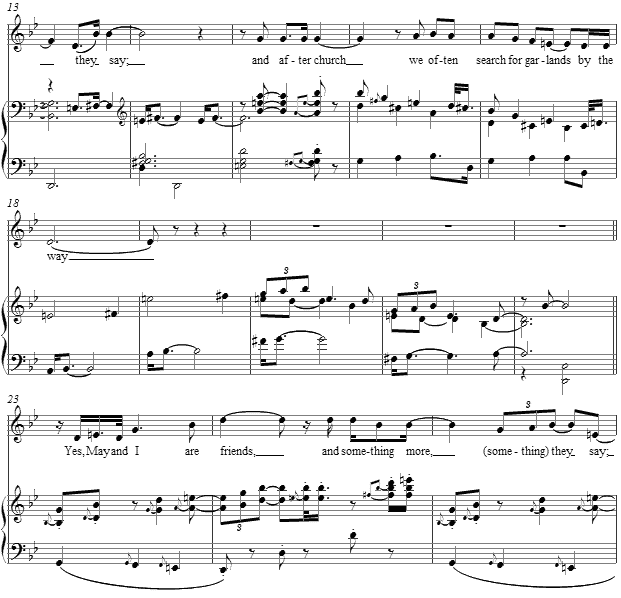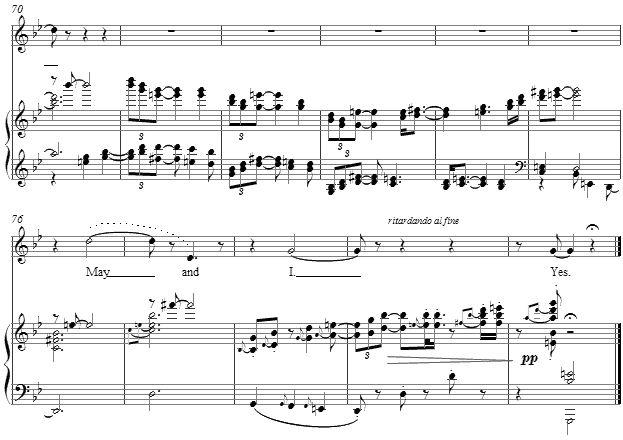Music and Texts of GARY BACHLUND
Vocal Music | Piano | Organ | Chamber Music | Orchestral | Articles and Commentary | Poems and Stories | Miscellany | FAQs
After Church - (2009)
Samuel Alfred Beadle
for medium voice and piano
Yes, May and I are friends,
Lovers, many have said;
For down the lane and o'er the lea
To church we often tread,
In that careless sort of way,
That leads to love, they say;
And after church we often search
For garlands by the way.
Yes, May and I are friends,
And something more, they say;
Because along the curved strand,
Where we sat the other day,
I simply wrote her name,
And wrote it o'er again;
When after church we stopped to search
For shells along the main.
More than friends are we,
My bonny May and I;
At least that's what our neighbors say
Whene'er they pass us by,
They smile and wink their eye,
And set their necks awry:
When after church we stop to search
For heart's ease, May and I.[ 5 pages, circa 5' 00" ]
Samuel Alfred Beadle
Georgia-born Samuel Alfred Beadle (1857-1932) was an American attorney, author and poet. After the Civil War was ended, Beadle moved to to Jackson, Mississippi, where he studied and then began the practice of law, finally ending his life in Chicago. As poet, Beadle's topics include love of a number of different women as seen by various specific names in his texts, the squandering of one's youth, obedience to God, and race.
Of Beadle's opus one editor and critic wrote, "Occasional variations in metric and stanzaic patterns break the monotony of his verse, but most of it suffers from prosaic and awkward language and rhymes." I find it amusing that critics -- this one shall remain unnamed -- will offer such words while not turning their own pen towards poetry. From my limited reading, Beadle evidences Cummings' later advice to poets to be "nobody-but-yourself," an admirable pursuit for any artist.
The text is taken from Sketches from Life in Dixie (Chicago: Scroll Publishing and Literary Syndicate, 1899), and a second anthology of Beadle's poems is titled, Lyrics of "The Underworld" (Jackson, Mississippi: W. A. Scott, 1912)
The three stanzas are quite similar in construction, and for this I chose a simple verse form, with a interlude between which lengthens in its successive appearances. The repetition of "yes" which is Beadle's opening gambit is used to stress lines in subsequent measures while underscoring Beadle's coy approach to not quite saying the obvious. The secco quality of some gestures also heighten the playfulness of this text and light syncopations add a jaunty air to the whole.
The last lines of each stanza, at "after church," become more sweet, less syncopated as Beadle shows us some of the things which the lovers do "after church." The interludes suggest a tenderness to the relationship, before taking up the next stanza of the poem.
The small coda is the final extended interlude as the vocal line repeats the last phrase of the poem followed by the first word again, to suggest this pattern repeats yet further, beyond the setting and beyond the telling of the tale in such images as the poet offers.
The score is available as a free PDF download, though any major commercial performance or recording of the work is prohibited without prior arrangement with the composer. Click on the graphic below for this piano-vocal score.



